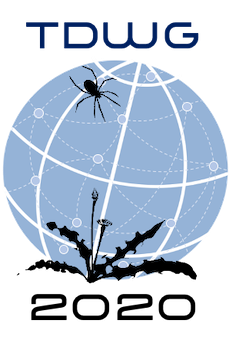Join iDigBio at the Biodiversity Information Standards (TDWG) Conference 2020!
Due to the pandemic, TDWG 2020 will be entirely virtual, and registration to attend is free. Working group sessions were held September 21-25, and the virtual conference is scheduled for October 19-23. See the October session schedule and register at https://www.tdwg.org/conferences/2020. A sampling of sessions are highlighted here:
Monday, 19 October 2020, 11am Eastern
Monday, 19 October 2020, 4pm Eastern
Organizers: Deborah L. Paul, iDigBio, Florida State University, Tallahassee, US; Cat Chapman, iDigBio, University of Florida, Gainesville, US
Digitization and publishing of museum specimen data is happening worldwide. While many museums are actively engaged in this process, others have yet to begin. Information about what collections hold is urgently needed by many stakeholders including the collections themselves, funders, researchers, policy-makers, countries, industry, and educators. At higher levels, museums can start by sharing what they know about their holdings, long before each item has its own record. But, if we are going to aggregate this “metadata” information from all natural science collections, the data need to be “standard.” If everyone shared in their own format, we could not compare or add up what we have, for example. To share this data in its most effective format, it needs to be standardized. But where does this standard come from, and how can it be used in practice?
This session will include presentations that introduce the first version of the new TDWG Collection Descriptions data standard, and examples of trying out the standard with real world collection descriptions use cases. It will also, through a short talk and discussion session, consider the bigger picture of a communal approach to describing our collections at a global level, building on the outputs of GBIF’s recent open consultation on "Advancing the Catalogue of the World’s Natural History Collections".
Thursday, 22 October 2020, 6pm Eastern
Friday, 23 October 2020, 10am Eastern
Organizers: Falko Glöckler, Museum für Naturkunde Berlin, Berlin, DE
Digital specimens represent physical collection objects in cyberspace and consist of references to data and metadata related to the collection object. Through continuous processes of digitizing legacy data, gaining new knowledge from research, annotating and linking to related resources a digital specimen can evolve independently from the original physical object. In order to provide, track and make use of the linked digital specimens in the collection-holding institutions the community might need to think of digital specimens as standalone virtual collections that originate from physical collections. However, new versions of a digital specimen still derive from changes of the physical specimen as the (meta)data is being updated in collection management systems to document the state and treatment of the physical objects. Consequently, there is a challenge to enable the management of both: linked digital specimens in the World Wide Web and the local data of physical specimens in databases of collection-holding institutions and other tools and services.
In this session central questions on the requirements, obstacles and chances of implementing the concepts of digital specimens and extended specimens in software tools are being discussed. The aim is to identify the major tasks and priorities regarding the transformation of tools and services from multiple perspectives: local collection data management, international data infrastructures like DiSSCo and GBIF, data usage outside of domain specific subject areas.
Friday, 23 October 2020, 1pm Eastern
Organizers: Pamela Soltis, University of Florida/iDigBio, Gainesville, US; Deborah Paul, iDigBio/Florida State University, Tallahassee, US
The COVID-19 pandemic, zoonoses, and pathogens in general provide key opportunities to highlight the predictive value of collections and the information specimens and related materials (e.g. genetic / genomic data, associated species data, trait data) can contribute to ecological understanding, tracking the origin and transmission of disease, policy development, and global infrastructure needs. In addition, the current pandemic highlights (and has encouraged) much-needed cross-disciplinary collaboration and the impetus to advance changes needed in standards of practice. For these reasons, representatives from SPNHC, iDigBio, NSCA, and the US mammalogy, virology, and disease ecology communities formed the ViralMuse task force. Leadership from SPNHC, GBIF, iDigBio, Pensoft, and Plazi, along with relevant domain scientists, joined the COVID-19 Task Force convened by CETAF and DiSSCo to identify both short-term responses and longer-term prediction and mitigation roles for these communities. Ongoing efforts show data and knowledge gaps for pathogens and their hosts as well as possible solutions for data integration. Behind these data integration efforts are needs for standards development and adoption.








